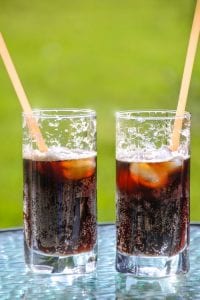Written by Taylor Woosley, Staff Writer. Study findings show that younger adults with SSB intake ≥2 servings/day displayed a 50% increase in CVD mortality. The mortality risk increased up to 2.5 times for subjects without CVD risk factors.
 Cardiovascular diseases (CVD) are the leading causes of death worldwide, accounting for around 31% of global deaths1. In the United States alone, over 659,000 deaths per year occur due to CVD2. Traditional risk factors for CVD include decreased vascular function through arterial stiffness and endothelial function, along with chronic inflammation3. Furthermore, an unhealthy diet characterized by an excess of added sugar, saturated fats, and a lack of fruits, vegetables, and fiber has been recognized as an important casual CVD risk factor4.
Cardiovascular diseases (CVD) are the leading causes of death worldwide, accounting for around 31% of global deaths1. In the United States alone, over 659,000 deaths per year occur due to CVD2. Traditional risk factors for CVD include decreased vascular function through arterial stiffness and endothelial function, along with chronic inflammation3. Furthermore, an unhealthy diet characterized by an excess of added sugar, saturated fats, and a lack of fruits, vegetables, and fiber has been recognized as an important casual CVD risk factor4.
Sugar-sweetened beverage (SSB) consumption has become a focus of global health efforts, as high levels of SSB consumption is casually associated with increased risk of obesity, type 2 diabetes and cardiovascular disease5. SSBs are the largest source of added sugar in the diet and include soft drinks, fruit drinks, and sports drinks that contain added caloric sweeteners such as fructose6. Among younger adults, SSBs contributed 9.3% of daily calories in men and 8.2% in women, with intake levels nearly exceeding dietary recommendations for consuming no more than 10% of total energy from all added sugar7.
Chen et al. conducted a prospective study to better understand the link between SSB consumption and CVD mortality among younger adults. Participants (n=288,747, aged 20-39) were included if they could provide information about SSB intake and were followed up on between 1994 and 2017. Subjects received a physical examination and review of their medical history based on self-administered questionnaires. A series of tests for blood, urine, chest radiography, electrocardiography, and pulmonary function were performed. Mortality risks of expanded CVDs were also calculated as a sensitivity analysis by including mortalities related to CVDs, diabetes, or kidney diseases. Subjects registered the type and intensity of weekly pleasure time physical activity (LTPA) during the previous month, with exercise types being classified into four categories.
Cox models were used to measure hazard ratios (HRs) with 95% confidence intervals of mortality by adjusting for age, sex, education levels, smoking status, alcohol drinking status, physical activity, BMI, hypertension, and diabetes. Sensitivity analyses were conducted to evaluate the independent role of SSBs in contributing to CVD mortality, excluding those with CVD-related risk factors.
Significant findings of the study are as follows:
- The positive association with CVD mortality was noted when SSB intake was ≥2 servings/day (HR: 1.59, 95%CI: 1.16-2.17).
- After including mortalities from diabetes and kidney disease added to CVDs, the expanded CVD mortality risk was 1.49 (95%CI: 1.11-2.01).
- Younger adults with SSB intake ≥servings/day had a 50% increase in CVD mortality, with the mortality risk increasing up to 2.5 times for those without CVD risk factors.
- The dose-response relationship continued (p<0.05 for trend) in each Cox model.
Overall, results of the study note the dose-response relationship between SSB intake quantity and CVD mortality risk of CVD in younger adults. Future studies should continue to explore the role SSB intake has on a variety of other biomarkers and diseases. Study limitations include the potential recall bias of subjects when filling out the self-reporting questionnaires on their health history and SSB intake.
Source: Chen, Chien-Hua, Min-Kuang Tsai, June-Han Lee, Christopher Wen, and Chi-Pang Wen. “Association of Sugar-Sweetened Beverages and Cardiovascular Diseases Mortality in a Large Young Cohort of Nearly 300,000 Adults (Age 20–39).” Nutrients 14, no. 13 (2022): 2720.
© 2022 by the authors. Licensee MDPI, Basel, Switzerland. This article is an open access article distributed under the terms and conditions of the Creative Commons Attribution (CC BY) license (https://creativecommons.org/licenses/by/4.0/).
Click here to read the full text study.
Posted September 1, 2022.
Taylor Woosley studied biology at Purdue University before becoming a 2016 graduate of Columbia College Chicago with a major in Writing. She currently resides in Glen Ellyn, IL.
References:
- Vargas-Rosvik S, Lazo-Verdugo N, Escandón S, Ochoa-Avilés C, Baldeón-Rojas L, Ochoa-Avilés A. Cardiovascular risk among 6-8-year-old children living in urban and rural communities in Ecuador: A cross-sectional analysis. Front Nutr. 2022;9:925873. doi:10.3389/fnut.2022.925873
- McCunney RJ, Yong M, Warheit DB, Morfeld P. Occupational Exposure to Poorly Soluble Low Toxicity Particles and Cardiac Disease: A Look at Carbon Black and Titanium Dioxide. Front Public Health. 2022;10:909136. doi:10.3389/fpubh.2022.909136
- da Silva RSN, da Silva DS, Waclawovsky G, Schaun MI. Effects of aerobic, resistance, and combined training on endothelial function and arterial stiffness in older adults: study protocol for a systematic review and meta-analysis. Syst Rev. Aug 13 2022;11(1):171. doi:10.1186/s13643-022-02036-w
- Khoury N, Gómez-Donoso C, Martínez M, et al. Associations Between the Modified Food Standard Agency Nutrient Profiling System Dietary Index and Cardiovascular Risk Factors in an Elderly Population. Front Nutr. 2022;9:897089. doi:10.3389/fnut.2022.897089
- Miller C, Wright K, Dono J, et al. “You can’t just eat 16 teaspoons of sugar so why would you drink 16 teaspoons’ worth of sugar?”: a qualitative study of young adults’ reactions to sugary drink warning labels. BMC Public Health. Jun 22 2022;22(1):1241. doi:10.1186/s12889-022-13648-1
- Malik VS, Hu FB. Sugar-Sweetened Beverages and Cardiometabolic Health: An Update of the Evidence. Nutrients. Aug 8 2019;11(8)doi:10.3390/nu11081840
- Malik VS, Li Y, Pan A, et al. Long-Term Consumption of Sugar-Sweetened and Artificially Sweetened Beverages and Risk of Mortality in US Adults. Circulation. Apr 30 2019;139(18):2113-2125. doi:10.1161/circulationaha.118.037401
